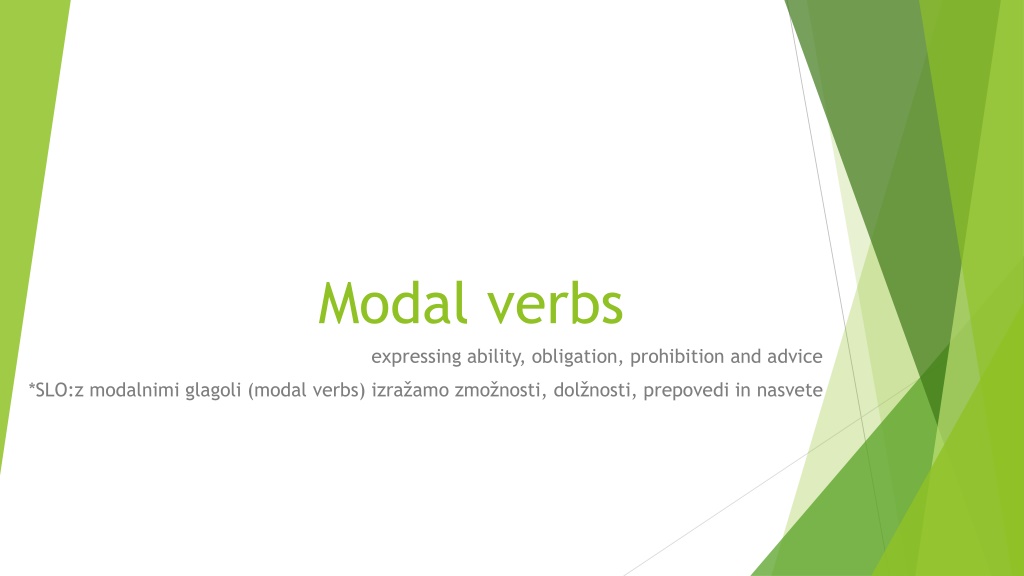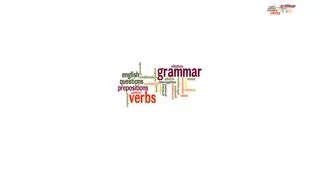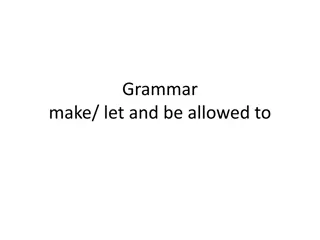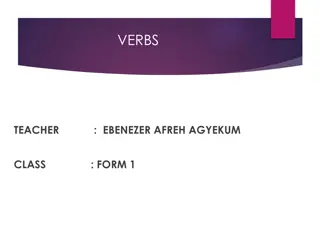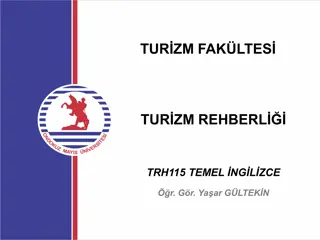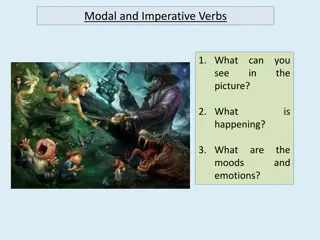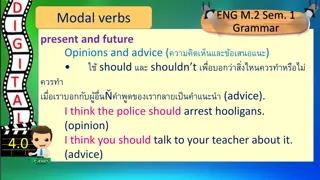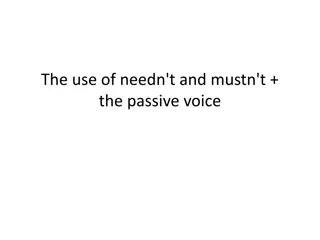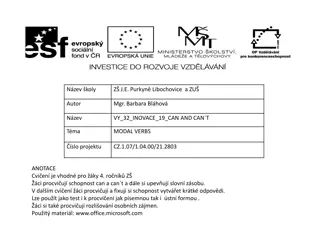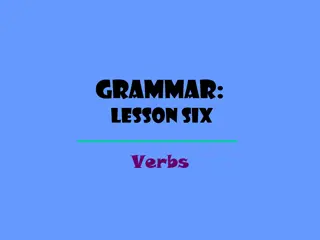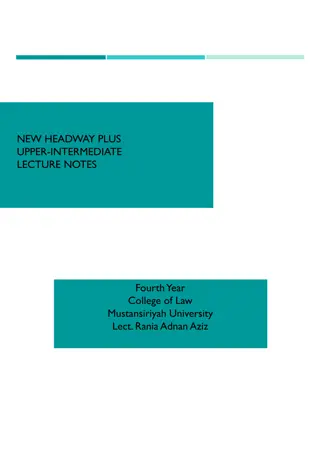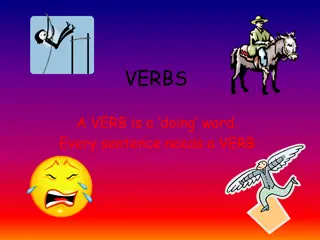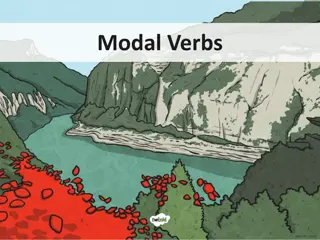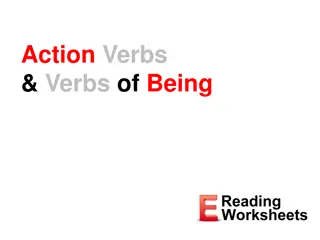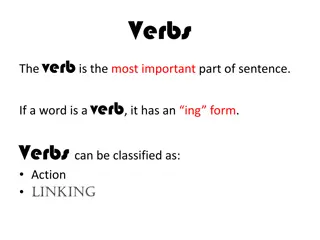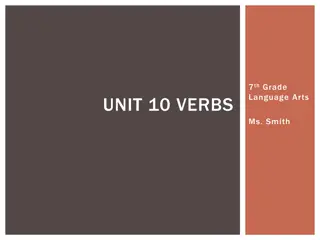Understanding Modal Verbs for Ability, Obligation, Prohibition, and Advice
Modal verbs play a crucial role in expressing ability, obligation, prohibition, and advice in English. They help convey various nuances in meaning such as capability, necessity, restrictions, and suggestions. By exploring modal verbs like "can", "could", "must", and others, you can develop a deeper understanding of how these verbs shape communication patterns.
Download Presentation

Please find below an Image/Link to download the presentation.
The content on the website is provided AS IS for your information and personal use only. It may not be sold, licensed, or shared on other websites without obtaining consent from the author. Download presentation by click this link. If you encounter any issues during the download, it is possible that the publisher has removed the file from their server.
E N D
Presentation Transcript
Modal verbs expressing ability, obligation, prohibition and advice *SLO:z modalnimi glagoli (modal verbs) izra amo zmo nosti, dol nosti, prepovedi in nasvete
Modal verbs expressing ability Modalni glagoli za izra anje zmo nosti/sposobnosti Ability can be both physical or mental. Do you see the difference in sentences below? A) I can dance and swim. fizi no zmorem B) My sister can speak French perfectly. mentalno zmorem Namesto can lahko uporabimo tudi kak no drugo besedo. Razmisli, kako bi lahko druga e rekli: I can run faster than my sister. Re itev: I am able to run faster than my sister. namesto CAN smo uporabili BE ABLE TO TASK: Make the sentence negative and put it in the past tense. I am able to run faster than my sister negative I am not able to run faster than my sister. past tense I was not able to run faster than my sister.
CAN/COULD poleg izraanja zmonosti uporabljamo tudi za izra anje: Pro enj (requests): Can I go to the toilet, please? Could you tell me where Tom lives? *could je bolj vljudno kot can Mo nosti (chance): It could snow tomorrow but I don t think so. = Mo no je, da bo jutri sne ilo ( e se jaz s tem strinjam ali ne je popolnoma vseeno). NALOGA: poskusi dopolniti vajo na sliki. To smo e delali U, str. 56
Modal verbs expressing obligation and prohibition Modalni glagoli za izra anje dol nosti in prepovedi EXPRESSING OBLIGATION (izra anje dol nosti): Do you remember the difference between MUST and HAVE TO? Take a look at the examples: Oh, my sister has a birthday party next weekend. I must buy her something. Everyone has to wear slippers at school. TASK: put both sentences in the past tense. Re itvi: I had to buy her something. Poglej povedi in poi i napake: Everyone had to wear slippers at school. TASK 2: put both past tense sentences in the negative. Re itvi: I didn t have to buy her anything. Everyone had to wear slippers last year, but now we don t have to anymore.
TASK: make questions from the sentences I must do my HW every day. Must I do my HW every day? I have to do my homework every day. Do I have to do my homework every day? TASK 2: make the sentences negative as well: I mustn t do my homework every day. =I m not allowed to do it. I don t have permission to do it. (=ni mi dovoljeno delati naloge vsak dan! lahko, da gre za prepoved, etudi zveni sme no). I don t have to do my homework every day. = tak nemu primeru re emo absence of obligation (=tega ni obvezno narediti)
Prohibition Prepovedi You mustn t shout at school. Kako bi lahko to poved povedali e druga e / z drugimi besedami? Za ni z It is not Re itev: It is not allowed to shout at school. TASK: Make some examples with the help of the photos on the right:
Modal verbs expressing advice or suggestion Modalni glagoli za izra anje nasvetov ali predlogov Should = advice Must = obligation You must be fit if you go on the Desert Challenge. You should take a map if you go on the Desert Challenge. TASK: GIVE your own example: A: I am always tired in the morning. What should I do? B: (I think) You should go to bed earlier. OR You shouldn t play video games till late at night. USE should / shouldn t OR must / mustn t in the exercise on the right:
V ZVEZEK V CELIH POVEDIH: Podnaslov: EXERCISE: must, mustn t, can, should, don t have to, can t I can hear you quite well. You ___________ not shout. She__________ ride her bike at night without lights. It's not allowed. She __________ not eat so much chocolate because it's bad for her figure. Talk to Ann about your problems. I'm sure she ________ help you. You ______ vacuum the carpets because Carol has already done it. Smoking is very unhealthy. You _________ stop it. You _____________ use a mobile phone in class. I ____________ ride a bike until I was 8! We _______________ learn about modal verbs in autumn again! We ________ learn all about them in ZOOM meetings?!
